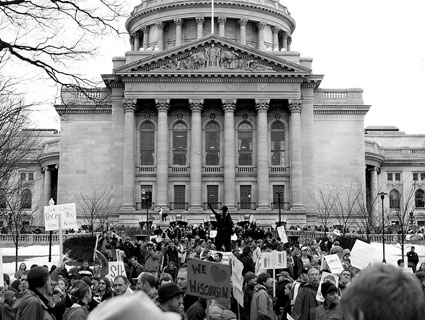Previewing a protest on the Hill targeting the GOP leadership’s failure to sufficiently cut the federal budget, the Washington Times ran a front-page, above the fold story headlined “Tea party to storm capital for ‘gut check.'” The storm never came—unless you are referring solely to the weather.
Given the weak turnout for the “continuing revolution” event, as the Tea Party Patriots dubbed it, it would be hard to say that any storming occurred at the rally—unless you are solely referring to the weather. Maybe 40 or 50 tea partiers turned out for the “continuing revolution” rally. Granted, it was 40 degrees and raining out, but tea partiers are a hearty bunch who are not usually deterred by bad weather. The problem may lie with the issue at hand: it’s awfully hard to mobilize people around yet another “continuing resolution” to keep the government open.
Tea partiers, or at least a few dozen of them, are mad that Republicans haven’t acceded to tea party demands to cut $100 billion out of the 2011 budget, instead of the $61 billion or so that have been proposed in a series of two-week budget extensions. It’s not the sexiest of issues, especially when compared with the (apocryphal) death panels that featured in the health care debate. Even tea partiers who did make it to the rally acknowledged that the budget fight was over crumbs. “When you’re a trillion in the hole, you’ve got to do something pretty drastic,” acknowledged Roger Meredith, a tea partier from Virginia who conceded that even $100 billion wouldn’t change much.
Still, the Republican House members who showed up to address the small crowd insisted that $60 billion was a big deal. Indiana Rep. Mike Pence, who appears to be auditioning for a vice presidential nomination in 2012, and Rep. Michele Bachmann (R-Minn.) insisted that it was a “good starting point” if not the end goal. They did, however, recommend that the tea partiers hold their feet to the fire and make sure they finish the job. Newly elected Illinois Rep. Joe Walsh urged the crowd to “pat us on the back” but make sure to “have the boot ready to put somewhere the sun doesn’t shine.”
The paltry attendance doesn’t mean tea partiers aren’t busy working the political system—they are—but they seem to be doing a lot more of that back home rather in DC these days. But it also suggests that the organizing group, Tea Party Patriots, isn’t as powerful as it’s been made out to be in the media. The group’s leaders Jenny Beth Martin and Mark Meckler are on TV or quoted in various media outlets almost daily, but there have been questions about how many people they really represent. Thursday’s turnout should only further those questions.
The rally seemed to suffer from the logistical support of better-funded corporate-backed advocacy groups who ensured plenty of boots on the ground for previous tea party rallies in DC. Groups like Koch-funded Americans for Prosperity organized buses to import activists from many other states, and Dick Armey’s FreedomWorks lent its organizing muscle from its Washington headquarters. A representative from Americans for Prosperity showed up on Thursday to talk about turning Medicaid into a block grant to save money (“We’re going to get people off Medicaid by getting them to work,” said Phil Karpen, AFP’s vice president for policy). But there were none of the pre-printed signs in the crowd that AFP has made ubiquitous at past Washington tea party rallies. FreedomWorks was MIA.
Instead, the event seemed like it was mostly a chance for the congressional tea party caucus to field-test applause lines for future speeches while reaching a bigger audience on C-Span, which broadcast the rally. (Kentucky’s Rand Paul, one of the few senators to make an appearance, clearly needed some practice: “We can climb a hill!” he declared in a quick speech.) Tea partiers, though, were happy to listen, and they insisted that the movement was hardly falling apart. “We’re trying to convince these people they need to cut,” said John Moorefield, from the Yadkin Valley, North Carolina, tea party. “We’re standing conservative.”






